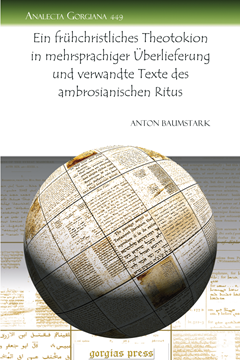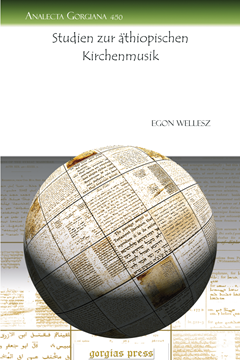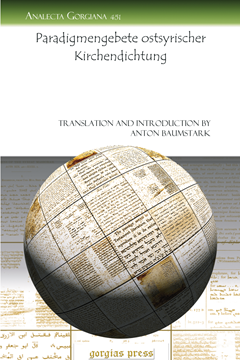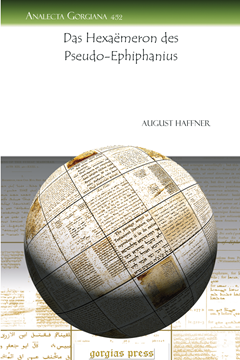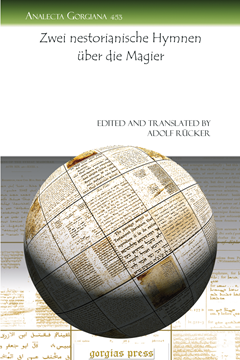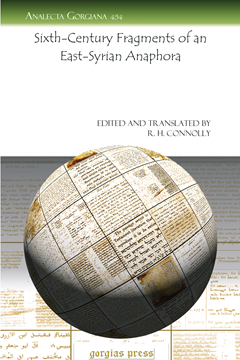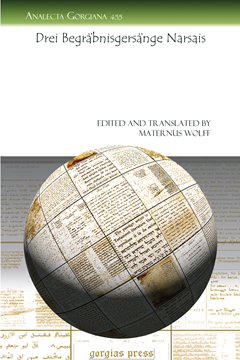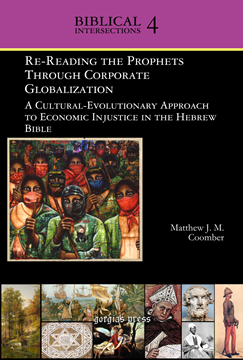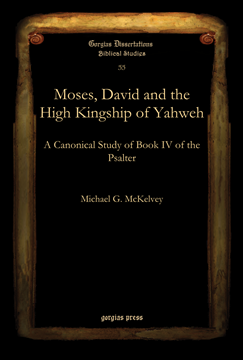Ein frühchristliches Theotokion in mehrsprachiger Überlieferung und verwandte Texte des ambrosianisc
Series: Analecta Gorgiana 449
ISBN: 978-1-60724-883-5
Anton Baumstark compares the Greek text of a Theotokion preserved in a sixth-century manuscript to comparable texts from the Oriental Christian traditions and the Western Ambrosian Rite.
$36.00 (USD) $21.60 (USD)
Studien zur äthiopischen Kirchenmusik
By Egon Wellesz
Series: Analecta Gorgiana 450
ISBN: 978-1-60724-884-2
Egon Wellesz presents here a thorough study of music in the Ethiopic Christian tradition. Wellesz’s discussion includes a survey of previous literature, a comparison of musical features with other traditions, and examples of Ethiopic musical texts.
$38.00 (USD) $22.80 (USD)
Paradigmengebete ostsyrischer Kirchendichtung
Translation and Introduction by Anton Baumstark
Series: Analecta Gorgiana 451
ISBN: 978-1-60724-885-9
Anton Baumstark surveys the possible literary sources for liturtgical hymn prayers of the Eastern Syriac tradition and also provides a Latin translation of nineteen such prayers found in Bedjan’s Chaldean Breviary.
$38.00 (USD) $22.80 (USD)
Das Hexaëmeron des Pseudo-Ephiphanius
Series: Analecta Gorgiana 452
ISBN: 978-1-60724-886-6
August Haffner provides a critique of Ernst Trumpp’s use of the Ethiopic and Arabic sources used in his publication of the Hexamaron of Pseudo-Ephiphanius.
$42.00 (USD) $25.20 (USD)
Zwei nestorianische Hymnen über die Magier
Edited and Translated by Adolf Rücker
Series: Analecta Gorgiana 453
ISBN: 978-1-60724-887-3
Adolf Rücker publishes here the Syriac text and German translation of two poems about the Magi from the “Nestorian” Syriac tradition and discusses the unique features of the Magi narrative present in the Syriac sources.
$36.00 (USD) $21.60 (USD)
Sixth-Century Fragments of an East-Syrian Anaphora
Edited and Translated by R. H. Connolly
Series: Analecta Gorgiana 454
ISBN: 978-1-60724-888-0
Although this fragmentary Eastern Syriac Anaphora was previously published by G. Bickell, R.H. Connolly disagreed with several editorial and conjectural decisions. Thus, Connolly publishes here his own edited version of the text accompanied by a Latin translation and extended notes.
$37.00 (USD) $22.20 (USD)
Drei Begräbnisgersänge Narsais
Edited and Translated by Maternus Wolff
Series: Analecta Gorgiana 455
ISBN: 978-1-60724-889-7
P. Maternus Wolff publishes here the Syriac text and German translation of three burial hymns by Narsai that were originally included in an unfinished work by Karl Macke. Wolff also includes an introduction and a critical apparatus for the text.
$37.00 (USD) $22.20 (USD)
Re-Reading the Prophets Through Corporate Globalization
A Cultural-Evolutionary Approach to Economic Injustice in the Hebrew Bible
Series: Biblical Intersections 4
ISBN: 978-1-60724-978-8
Using societal patterns of exploitation that are evidenced in agrarian societies from the Bronze Age to modern-day corporate globalization, Re-Reading the Prophets offers a new approach to understanding the hidden contexts behind prophetic complaints against economic injustice in eighth-century Judah.
$168.00 (USD) $100.80 (USD)
Moses, David and the High Kingship of Yahweh
A Canonical Study of Book IV of the Psalter
Series: Gorgias Biblical Studies 55
ISBN: 978-1-61143-682-2
Has the Old Testament Psalter been purposefully arranged? Does this arrangement convey an overall message? This book enters into the growing discussion regarding the canonical arrangement of the Psalms by examining Book IV (Pss 90-106) and considering the book's overall theological and thematic message within the literary context of the Psalter. This volume argues that Psalms 90-106 have been purposely arranged as a rejoinder to the previous three books, in response to the rise and fall of Davidic kingship. This hypothesis is tested by examining how Psalms 90-106 may have been purposely organized as a collection.
$177.00 (USD) $106.20 (USD)
Sindban, oder die sieben weisen Meister
Syrisch und Deutsch
Edited and Translated by Friedrich Baethgen
Series: Analecta Gorgiana 456
ISBN: 978-1-60724-894-1
This volume is Baethgen’s dissertation from the University of Leipzig, in which he presents the Syriac text, based on the only manuscript of the work (from Berlin), along with an annotated German translation and an introduction.
$45.00 (USD) $27.00 (USD)
